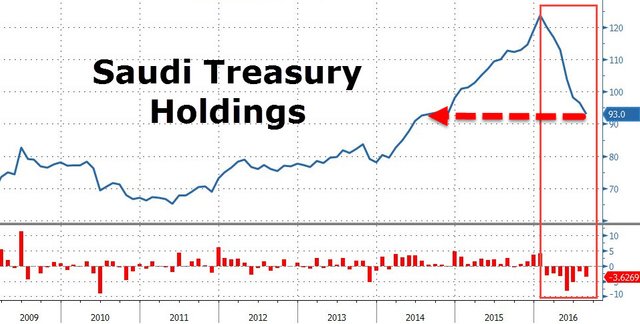How soon before Saudi Arabia's financial reserves run out?
Most people reading this will be pleased to learn that Saudi is in big trouble.
Their financial reserves, which stood at $750 bn in 2014, have dropped to $555 bn as at August 2016. They are going through it at about $100 bn a year. They are running a budget deficit of 13.6% of GDP, and are struggling to finance their wars in Yemen and Syria.
Even worse for them, their currency the rial is pegged to the US dollar, and in order to hold the rial up they have to sell dollars and buy rials. Their stock of US treasuries is being sold to fund this. See the following chart:
They have cut fuel and water subsidies, and are raising taxes on expats (Saudis themselves don't pay tax). There are 9 million expats in Saudi who effectively run their oil fields, and they were drawn there by the zero tax deal - why they would consider staying on if their taxes were raised is anyone's guess. It is a hardship posting already (no alcohol, your wife is confined at home, horrible weather etc).
Two-thirds of Saudi citizens are employed by the government, and they're trying to cut the numbers - but Saudis are notoriously lazy and don't like working in the private sector because it is more demanding (hence the reason they employ expats in the private sector).
In the meanwhile they are borrowing money in the bond markets. The markets are lending because from time to time Saudi convenes an OPEC meeting where they talk about capping production and raising the oil price. Each time this happens, the oil price rises. Then US inventories come out showing a glut in supply and the oil price falls back again. If oil prices start heading back down to $20, it is unlikely the markets will continue to lend to them.
What happens when they run out of money? The wars in Yemen and Syria will stop (all the players, Saudi, Russia, Iran and ISIS are funded by oil). They will be unable to fund their propaganda operations abroad, where they try to spread wahabism. And it is likely there will be an uprising in Saudi itself - in the southern part of Saudi, where the oil fields are located, the people are not Sunni wahabis, but instead oppressed Shia who hate the Saudi royal family with a purple passion.
Of course if the oil price rises, they will be back on track. If people genuinely want to curb their influence, the best thing they can do is curb their use of oil: drive fuel efficient cars, cut down on journeys, heat their houses using solar power or wind, do everything you can to reduce demand and keep that oil price low enough to trigger a breaking point.

If your scenario is correct, then what's not like? An oppresive and authoritarian regime comes to the end of its life. I guess the only worry is: what will replace it?
My scenario will only come to pass if the oil price stays low for the next couple of years.
As to what will replace it - uprisings in the Middle East have only gone wrong because Saudi interfered and financed interference - for example ISIS is saudi funded and if it didn't exist neither Iraq nor Syria would be having problems. If there is no-one with the money to interfere, then I guess it will get resolved pretty fast according to what locals want.
The problem is that people don't want to cut down on the oil they are using. They might not like what Saudi is doing, but they don't hate them enough to change their behavior and stop funding them by cutting their use of oil.